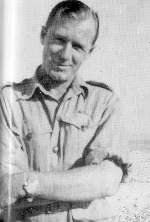Guy Prendergast (British Army officer)
Guy Lenox Prendergast DSO (c. 8 July 1905 - 6 October 1986) was an English Saharan explorer, and British Army soldier in World War 2. He was the Commanding Officer of the Long Range Desert Group from 1941 to 1943.[1]
Guy Lenox Prendergast | |
|---|---|
 Guy Lenox Prendergast | |
| Born | c. 1905 Windsor, Berkshire, United Kingdom |
| Died | October 6, 1986 (aged 81) Fort Augustus, Inverness-shire, Scotland |
| Service/ | |
| Rank | Brigadier |
| Unit | Long Range Desert Group Special Air Service |
| Commands held | Long Range Desert Group |
| Battles/wars | Second World War |
| Awards | Distinguished Service Order |
Early life
Guy Lenox Prendergast was one of a group of British Saharan explorers in the late 1920s and early 1930s, which included Ralph Alger Bagnold, Pat Clayton and Bill Kennedy Shaw, who had explored the desert before World War 2 and had gained much valuable experience in navigating its hostile terrain.[2] Prendergast learnt to fly as part of the Western Arab Corps in Sudan in the 1930s.[3]
Military career
After the outbreak of World War 2 Prendergast received a commission with the British Army's Royal Tank Regiment. Together with his explorer associates he was involved in the formation of the Long Range Desert Group (L.R.D.G.) under the command of Bagnold.[2] On 1 August 1941 Prendergast was promoted Lieutenant Colonel, and was appointed as the Commanding Officer of the L.R.D.G., which he led between November 1941 and October 1943.[4]
After commanding the L.R.D.G., he went on to be Deputy Commander of Raiding Forces, and later Deputy Commander of the Special Air Service Brigade in 1944–1945, and subsequently Commander of the Free French SAS Regiments, with the rank of Brigadier-General. For his wartime service he was awarded the Distinguished Service Order in December 1942.[5] and the Czechoslovakian Order of the White Lion III Class.[6]
Death
He died on 6 October 1986 at the age of 81 years. His body was buried at Strathoich Cemetery, in Fort Augustus, Scotland.[7]
Notes
- 'The Long Range Desert Group in World War 2', by Gavin Mortimer (Pub. Osprey, 2017).
- Molinari 2007, p. 14
- Mortimer, Gavin (20 April 2017). The Long Range Desert Group in World War II. Osprey Publishing. p. 77. ISBN 978-1472819338.
- Molinari 2007, p. 19
- "No. 35697". The London Gazette. 8 September 1942. p. 3948.
- "No. 38122". The London Gazette (Supplement). 11 November 1947. p. 5354.
- Entry for Prendergast's grave, Findagrave website (2019). https://www.findagrave.com/memorial/146803328/guy-lenox-prendergast
References
- Molinari, Andrea (4 July 2007). Desert Raiders: Axis and Allied Special Forces 1940-43. Osprey Publishing. ISBN 978-1846030062.CS1 maint: ref=harv (link)
| Military offices | ||
|---|---|---|
| Preceded by Ralph Alger Bagnold |
Commander, Long Range Desert Group November 1941 – October 1943 |
Succeeded by John Richard Easonsmith |